
Occult detective fiction is a subgenre of detective fiction that combines the tropes of the main genre with those of supernatural, fantasy and/or horror fiction. Unlike the traditional detective who investigates murder and other common crimes, the occult detective is employed in cases involving ghosts, demons, curses, magic, vampires, undead, monsters and other supernatural elements. Some occult detectives are portrayed as being psychic or in possession of other paranormal or magical powers.

"Facts Concerning the Late Arthur Jermyn and His Family" is a short story in the horror fiction genre, written by American author H. P. Lovecraft in 1920. The themes of the story are tainted ancestry, knowledge that it would be best to remain unaware of, and a reality which human understanding finds intolerable.
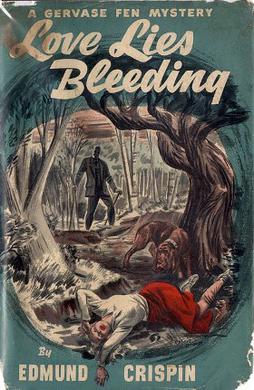
Love Lies Bleeding is a detective novel by Edmund Crispin, first published in 1948. Set in the post-war period in and around a public school in the vicinity of Stratford-upon-Avon, it is about the accidental discovery of old manuscripts which contain Shakespeare's long-lost play, Love's Labour's Won, and the subsequent hunt for those manuscripts, in the course of which several people are murdered. Collaborating with the local police, Oxford don Gervase Fen, a professor of English who happens to be the guest of honour at the school's Speech Day, can solve the case at the same weekend.

Heir Presumptive is a 1935 mystery crime novel by the British writer Henry Wade. It is largely an inverted detective story which reveals the killer early but also features a murder in which he is beaten to it by someone else, with numerous potential suspects.

The Man Who Grew Tomatoes is a 1959 mystery detective novel by the British writer Gladys Mitchell. It is the thirty second in the long-running series of books featuring Mitchell's best known creation, the psychoanalyst and amateur detective Mrs Bradley.

The Longer Bodies is a 1930 mystery detective novel by the British writer Gladys Mitchell. It is the third in her long-running series featuring the psychoanalyst and amateur detective Mrs Bradley.

The Golden Beast is a 1926 mystery thriller novel by the British writer E. Phillips Oppenheim. Oppenheim was prolific, bestselling author whose popularity reached its height during the interwar years. The novel was published in America by Little, Brown.
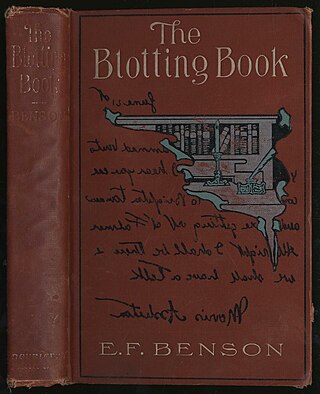
The Blotting Book is a 1908 mystery crime novel by the British writer E. F. Benson, later better known as the author of the Mapp and Lucia series. It was one of only two ventures he made into the genre during his prolific career along with The Luck of the Vails (1901). It takes place in Brighton and the nearby South Downs.

The Luck of the Vails is a 1901 mystery crime novel by the British writer E. F. Benson, later better known as the author of the Mapp and Lucia series. It was one of only two ventures he made into the genre during his prolific career along with The Blotting Book (1908). In his autobiography Benson numbered it as one of only four of his novels he was satisfied with.

Paying Guests is a 1929 comedy novel by the British writer E. F. Benson, best known as the author of the Mapp and Lucia series. The story takes place at Wentworth, a boarding house in the fictional resort town of Bolton Spa. It focuses on the eccentric collection of summer residents, mostly there to try and recover their health, overseen by the domineering former Indian Army Colonel Chase. According to a pair of critics, "The coming together of character and situation in Paying Guests creates a comic masterpiece, worthy to stand alongside the Mapp and Lucia books".

Secret Lives is a 1932 comedy novel by the British writer E. F. Benson, best known as the author of the Mapp and Lucia series. The structure is broadly similar to that series, featuring two strong-willed women battling for social supremacy in the fictitious Durham Square in Edwardian London.

Death at Four Corners is a 1929 mystery detective novel by Anthony Gilbert, the pen name of British writer Lucy Beatrice Malleson. It is the third novel in a series featuring her amateur detective Scott Egerton.
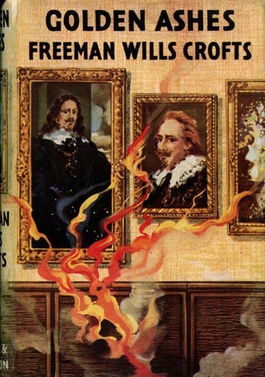
Golden Ashes is a 1940 detective novel by the Irish writer Freeman Wills Crofts. It is the twentieth in his series of novels featuring Inspector French, a prominent investigator of the Golden Age of Detective Fiction.

Tragedy on the Line is a 1931 detective novel by John Rhode, the pen name of the British writer Cecil Street. It is the tenth in his long-running series of novels featuring Lancelot Priestley, a Golden Age armchair detective who works alongside the less sharp-witted Superintendent Hanslet of Scotland Yard. It was published in the United States the same year by Dodd Mead.

Holy Disorders is a 1945 mystery novel by the English writer Edmund Crispin, the second in his series featuring the Oxford professor and amateur detective Gervase Fen. The novel is set during the Second World War. The title is a reference to Chaucer.

Swan Song is a 1947 detective novel by the British writer Edmund Crispin, the fourth in his series featuring the Oxford Don and amateur detective Gervase Fen. It was the first in a new three-book contract the author has signed with his publishers. It received a mixed review from critics.
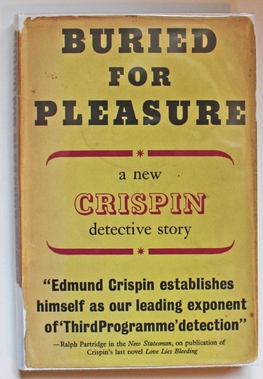
Buried for Pleasure is a 1948 detective novel by the British writer Edmund Crispin, the sixth in his series featuring the Oxford professor and amateur detective Gervase Fen. As with the rest of the Fen novels, a complex Golden Age-style mystery is combined with elements of farce. Fen contests a by-election in rural constituency, but events are rapidly overtaken by a murder case. It features Detective Inspector Humbleby who also appeared in the next novel Frequent Hearses as well as most of the short stories in the series.

Beware of the Trains is a collection of detective short stories by the British writer Edmund Crispin published in 1953. It contains sixteen stories including Beware of the Trains which gave its title to the collection. They all feature Crispin's amateur detective and Oxford professor Gervase Fen, an eccentric with a genius for solving complex cases. A number also featured Detective Inspector Humbleby of Scotland Yard who also appears in two of the novels in the Fen series. Apart from one they had all previously appeared in the Evening Standard newspaper. It was the last work featuring Fen for many years, until Crispin returned to the character for the 1977 novel The Glimpses of the Moon.
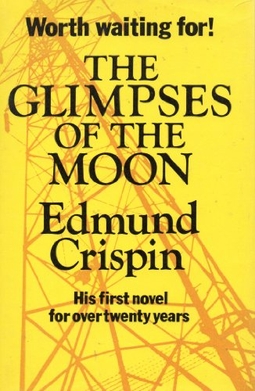
The Glimpses of the Moon is a 1977 detective novel by the British writer Edmund Crispin. It was the ninth and last novel in his series featuring Gervase Fen, an Oxford professor and amateur detective. Written from the 1960s onwards on publication it was the first novel in the series to be released since The Long Divorce in 1951. The author died the following year and in 1979 a final work Fen Country, a collection of short stories featuring the detective, was published posthumously.
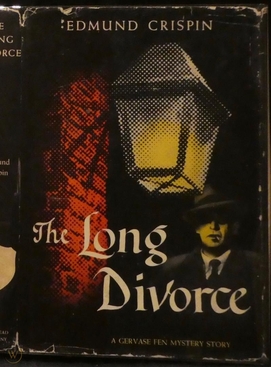
The Long Divorce is a 1951 detective novel by the British writer Edmund Crispin, the eighth in his series featuring the Oxford professor and amateur detective Gervase Fen. It was the penultimate novel in the series, with a gap or more than twenty five years before the next entry The Glimpses of the Moon, although a collection of short stories Beware of the Trains was published in 1953. The novel features many traits of a Golden Age mystery, set in a small, wealthy English village. The title doesn't refer to a marriage but is a quote from Shakespeare's Henry VIII "the long divorce of steel". It was published in the United States by Dodd, Mead in 1951 under the same title, and a year later as A Noose for Her.



















